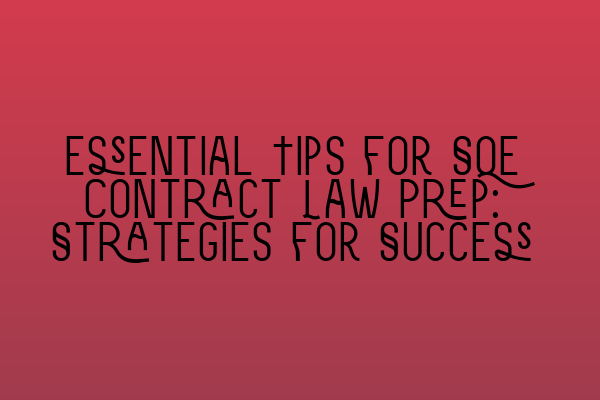Sure! Here’s the long blog post about ‘Essential Tips for SQE Contract Law Prep: Strategies for Success’:
Essential Tips for SQE Contract Law Prep: Strategies for Success
Preparing for the SQE Contract Law exam can be a daunting task. With the significant changes in the legal profession, passing this exam is crucial for aspiring solicitors. However, with the right strategies and proper preparation, success is within your reach. In this article, we will provide you with essential tips to help you ace the SQE Contract Law exam.
1. Understand the Exam Structure
Before diving into the study materials, it’s crucial to familiarize yourself with the exam structure. The SQE Contract Law exam consists of multiple-choice questions (MCQs) and practical assessments.
The MCQ section evaluates your knowledge and understanding of key contract law principles, cases, and doctrines. It’s important to focus on core topics such as offer and acceptance, consideration, intention to create legal relations, and terms of a contract.
The practical assessments test your ability to apply contract law principles to real-life scenarios. Practice answering hypothetical questions and familiarize yourself with the format and time constraints.
2. Create a Study Plan
Now that you understand the exam structure, it’s time to create a study plan. Start by allocating sufficient time for each topic based on its weightage. Break down your study sessions into manageable chunks and set realistic goals.
Consider using revision guides, textbooks, and online resources to enhance your understanding of contract law. Make use of flashcards and mind maps to consolidate key concepts and revise effectively. Regularly review your progress and adjust your study plan accordingly.
3. Practice with Past Exam Papers
One of the most effective ways to prepare for the SQE Contract Law exam is by practicing with past exam papers. This will help you familiarize yourself with the exam format, identify knowledge gaps, and improve your time management skills.
When answering past exam papers, pay attention to the marking scheme and structure your answers accordingly. Practice writing concise, well-structured answers that demonstrate a clear understanding of contract law principles.
4. Attend Review Courses or Workshops
If you find yourself struggling with certain topics or need additional guidance, consider attending review courses or workshops. These can provide valuable insights, clarify difficult concepts, and offer practical strategies for tackling the exam.
Review courses or workshops may also provide you with sample questions and mock exams, allowing you to gain confidence and refine your exam technique.
5. Join Study Groups
Studying alone can sometimes be isolating and overwhelming. Joining a study group can help you engage in discussions, share ideas, and clarify any uncertainties. Collaborating with peers who are also preparing for the SQE Contract Law exam can provide a fresh perspective and broaden your understanding of the subject.
Online forums and social media platforms can connect you with other aspiring solicitors studying for the same exam. Be sure to contribute to the discussions, ask questions, and take advantage of the collective knowledge within the group.
6. Seek Feedback
Regular feedback is essential for self-improvement. Seek feedback from your peers, mentors, or even professional tutors. Their insights can help you identify areas where you may need to focus more or improve.
Additionally, consider utilizing online platforms that offer automated feedback on practice questions and assessments. These platforms provide instant feedback, highlighting areas of improvement and enabling targeted study.
7. Take Care of Yourself
Lastly, don’t forget to prioritize self-care during your preparation for the SQE Contract Law exam. Make sure to get enough sleep, eat well, and engage in regular exercise. Taking care of your physical and mental well-being will enhance your focus, productivity, and overall performance during the exam.
In conclusion, passing the SQE Contract Law exam requires a combination of strategic planning, dedicated effort, and a solid understanding of contract law principles. By following these essential tips, you can enhance your preparation and increase your chances of success. Good luck!
